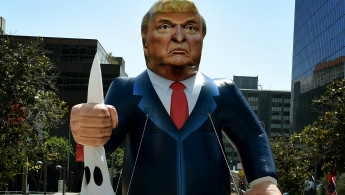Donald Trump suggests profiling Muslims
Donald Trump on Sunday suggested that the United States should "seriously" consider profiling Muslims inside the country as a terrorism-fighting tool, in the latest example of the Republican presidential nominee's policy proposals that single out Muslims.
"We really have to look at profiling," Trump said in an interview broadcast Sunday on CBS's Face the Nation. ''It's not the worst thing to do."
The statements are consistent with Trump's other, long-expressed views, including banning foreign Muslims from entering the country.
Trump has doubled down on this approach since the Orlando nightclub attack that killed 49 people.
In response to the tragedy, Trump accused American Muslims of knowing "where terrorists are" and not turning them into authorities. He also expanded his ban on Muslim immigration to include people from regions with a history of terrorism.
On Sunday, Trump also said the government should investigate mosques in the US in much the same way the New York Police Department's Demographics Unit spied on Muslims and mosques around the city with help from the CIA.
The group assembled databases on where Muslims lived, shopped, worked and prayed, infiltrated Muslim student groups, put informants in mosques and monitored sermons.
The NYPD, under Mayor Bill de Blasio, announced it had abandoned the program following lawsuits and complaints.
"You do (it) as they used to do in New York prior to this mayor dismantling" the programme, Trump said Sunday.
His increasing embrace of policies that could isolate Muslims in America is extraordinary for a candidate assured of his party's presidential nomination.
The proposals have been roundly dismissed and criticised by many Republican leaders, including House Speaker Paul Ryan.
Trump on Sunday cast the use of profiling as a matter of "common sense" over "political correctness."
Civil libertarians, Muslims and others have strongly disagreed, arguing that profiling is unconstitutional and discrimination based on race, religion and other factors.
Agencies contributed to this report





 Follow the Middle East's top stories in English at The New Arab on Google News
Follow the Middle East's top stories in English at The New Arab on Google News
![The UAE is widely suspected of arming the RSF militia [Getty]](/sites/default/files/styles/image_330x185/public/2024-11/GettyImages-472529908.jpg?h=69f2b9d0&itok=Yauw3YTG)
![Netanyahu furiously denounced the ICC [Getty]](/sites/default/files/styles/image_330x185/public/2024-11/GettyImages-2169352575.jpg?h=199d8c1f&itok=-vRiruf5)
![Both Hamas and the Palestinian Authority welcomed the ICC arrest warrants [Getty]](/sites/default/files/styles/image_330x185/public/2024-11/GettyImages-2178351173.jpg?h=199d8c1f&itok=TV858iVg)